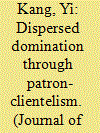|
|
|
Sort Order |
|
|
|
Items / Page
|
|
|
|
|
|
|
| Srl | Item |
| 1 |
ID:
172252


|
|
|
|
|
| Summary/Abstract |
This study is based on 10 years of ethnography research in six cities in Sichuan after the Wenchuan earthquake. The author delineates local officials’ dispersed clientelist endeavours seeking stable collaboration with NGOs. In contrast to the corporatism model, in which government control of NGOs is formal and from the top down, the patron–client relationship entails considerably more subjectivity, flexibility and dispersion in the exercise of state power, which may or may not result in effective implementation of the state’s policy objectives. As local government officials increasingly deploy their informal authority in addition to their extensive institutional power, and as informal networks lubricate the policy process, state dominance over society becomes more pervasive, entrenched and fragmented.
|
|
|
|
|
|
|
|
|
|
|
|
|
|
|
|
| 2 |
ID:
177627


|
|
|
|
|
| Summary/Abstract |
Local cadres in China form innovation partnerships with social workers from Hong Kong (HK) to learn new knowledge regarding public service delivery. How do cadres perceive and process information from HK social workers? How do cadres influence meaning construction towards a preferred redefinition? How do cadres reproduce new knowledge to guide real practice? This study answers these questions by scrutinizing the interactions between local cadres and HK social workers in their sense-making of three concepts, namely, innovation, indigenization, and professionalism. This study finds that mainland local cadres' views regarding the three concepts considerably differ from the views held by HK social workers. Thus, cadres exert strenuous efforts to reshape social workers' understanding to ensure that the introduction of new knowledge by this group of professionals conforms to the government's prior-set objectives and agenda. The dominance of cadres reduces the uncertainty involved in learning and, thus, enhances their receptivity to new knowledge but simultaneously curtails diversity and elasticity in government knowledge absorption, which decreases the prospect of double loop learning. Moreover, the serious power asymmetry between government cadres and social workers (both overseas and local) is reinforced in the knowledge absorption and reproduction processes.
|
|
|
|
|
|
|
|
|
|
|
|
|
|
|
|
| 3 |
ID:
179774


|
|
|
|
|
| Summary/Abstract |
This is a study of a group of Hong Kong social workers who have worked in mainland China for the past decade building a social work profession. In an unfamiliar environment full of uncertainties and obstacles, the interactions of these overseas professionals with local state and societal actors have effected change in the transmission of knowledge and techniques across borders, forging of local alliances to initiate change, adaptation of professional practices to local contexts, and contestation of encroachments on their professional autonomy, ethics, and standards. In their endeavours to introduce novel knowledge and practices into the mainland, these social workers have actively engaged with state agents and inspired indigenous societal actors, attempting to turn them into ‘rooted cosmopolitans’ and to create opportunities and platforms for state-in-society rather than state-versus-society scenarios.
|
|
|
|
|
|
|
|
|
|
|
|
|
|
|
|
| 4 |
ID:
192205


|
|
|
|
|
| Summary/Abstract |
By examining the case of rural Guangdong, this research elaborates on the practice of party-led social capital building (PSCB), which provides a Janus-faced mechanism for creating synergies between the local party-state and society: the Primary Party Organizations cultivate bonding, bridging, and linking social capital to enhance community engagement while deliberately limiting the democratizing potential of this process by selecting vetted nonstate actors, including social workers, private entrepreneurs, and official delegates from higher administrative levels, to serve as key nodes in the community networks. These delegates are tasked with gathering information, building trust and reciprocity, and influencing public opinion to ensure that mass participation in community affairs produces the results desired by the local party-state. The state-vetted key players are mobilized and controlled by the grassroots cadres through well-targeted actions, including party discipline and various carrot-and-stick incentives in the private and tertiary sectors. Reinvigorating the mass line by integrating party-building with the control of the nonstate sector, grid management, and cultural governance, PSCB calls for our reimagination of the governance nexus in grassroots China.
|
|
|
|
|
|
|
|
|
|
|
|
|
|
|
|
|
|
|
|
|